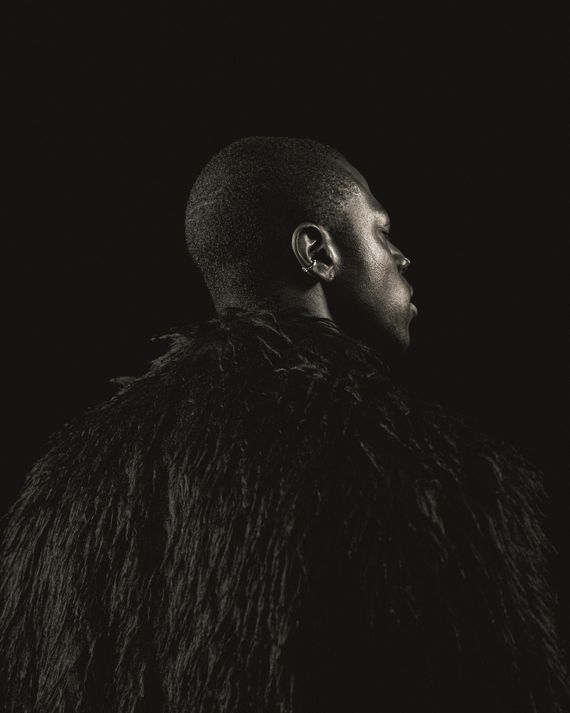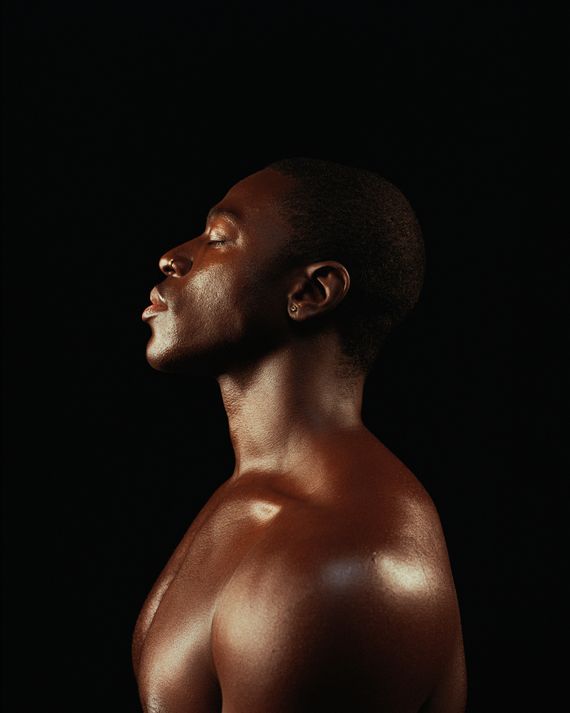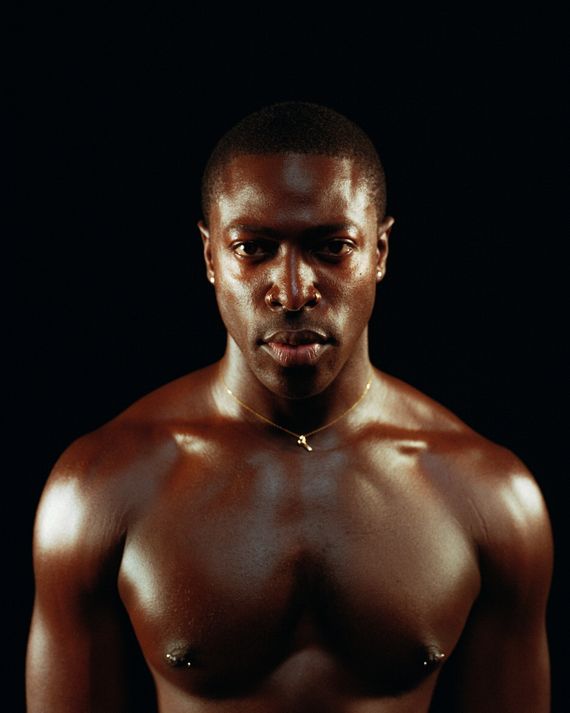
In the terraced garden of a mid-century house in the hills above the Sunset Strip, Moses Sumney is preparing for an intimate night of industry networking. It has been a swelteringly hot day, but the sun is starting to dip. A cool breeze is blowing in on the shaded gravel patio upstairs, where the musician and actor’s performance is being set up. Tall and striking in loose black pants, a black vest, and sunglasses and adorned with strings of gold necklaces, Sumney is running through a set list of songs from his upcoming EP, Sophcore, starting with the burbling “I’m Better (I’m Bad).” His band is relatively new (some of them met and rehearsed with Sumney for the first time just the day before), but you would never know it from listening as they warm up and lock in. Between lyrics, Sumney sings directions to the soundboard like “More guitar” and “Remember, we don’t have drums.” He asks saxophonist Alden Hellmuth to play some little arpeggios, and she comes in softly.
The mic stand holds three mics, one running through an Auto-Tune filter that makes Sumney sound tenderly distorted. It is adorned with a large bouquet of hydrangeas and wildflowers, as though his voice were coaxing the flowers to open. The audience, made up of music supervisors, eventually arrives for what’s known as a showcase. This is where Sumney will debut his new material in the hope that it might find placement in film and TV shows, adding to his list of more than 20 credits. He lightly roasts the crowd, asking if people finished cutting their trailers prior to the show and joking about clearing “needle drops.” He then introduces a song by suggesting what kind of movie it might soundtrack — one with a plot of childhood sweethearts reunited — and it slowly becomes clear that he’s describing Celine Song’s Past Lives.
He exhales meditatively and goes into the EP’s first single, “Vintage,” his voice warm as a vinyl record. “I remember how your nectar sweet / Now you got your specter hanging over me,” he sings. “I’ma take it back to 1993 / When I get my fingers on a time machine.” It’s an ode to an old love that feels like a nicely worn-in jacket. The sun sets across the street over a Netflix billboard that reads FAVORITE 3 WORDS: STARRING NICOLE KIDMAN.
Sumney, 32, has been putting out music known for its delicate beauty for a decade. His early projects, including his acclaimed first album, Aromanticism, turned him into a favorite of the indie-music-blog era and a prolific collaborator across genres. (The list of people he has worked with includes Skrillex, Bon Iver, Bruce Hornsby, Sufjan Stevens, James Blake, and Metro Boomin.) But he has spent a few years, on and off, holed up in what he calls a “monastic” lifestyle in Asheville, North Carolina, having lived alone in a cabin in the forest for a month with no internet or phone service. After a productive writing trip to the cabin for his first EP, 2014’s Mid-City Island, he moved there full time, inspired by a lifelong love of folk music, Thoreau’s Walden, and what he describes as an “energetic reaction of my spirit to being in the mountains.”
Sometime last year, though, Sumney started to feel something was missing. Sophcore stemmed from his realization that despite his natural predilection for solitude — when he was 6, a doctor told his mom he needed to get out more — he was craving something he couldn’t find alone in the woods: intimacy. “Especially as a storyteller, you need to understand people and interact with them,” he says over a pot of tea at Soho Warehouse in Downtown Los Angeles. “You can’t just tell made-up stories from your head. You need to experience disappointment and heartbreak and joy and fun and boredom around other people.” He started spending time again in big, often anxiety-inducing cities like New York, where he now lives part time, to remember how to be social. (He’s still adapting to being back on a phone all the time.) Sophcore is rooted in the pursuit of deep connection — to friends, lovers, and music.
This show is the launch of what Sumney jokingly calls his “new sonic identity.” While his previous releases have explored the more esoteric side of his musical interests, Sophcore, the title of which is a play on the dying art of soft-core porn, is a purposeful move into making R&B. His inspirations for the project were Janet Jackson, the godmother of songs expressing yearning and desire that you can also dance to, and Beyoncé’s Renaissance, with its visions of ecstatic communion. The throwback to 1993 in “Vintage” concerns a sensibility he thinks is largely missing from music now: big-time sensuality.
And so when he left the mountains, Sumney emerged with a plan. His new album, for which this EP is the lead-in, would hearken to the past. “Really, the foundation of R&B has always been love songs and ‘Baby, Come Back to Me’ songs,” he says. “The ’90s and 2000s, that was the peak era for men begging. And there’s kind of a softness to the men that went away.” As music became more sexually explicit, it also got more emotionally jaded and avoidant. Sumney wants to take it back to when it “allowed for R&B guys like Tyrese to be in the shower crying, or Usher being like, ‘Well, these are my confessions. I really fucked up. Please come back to me.’” He pulls up a TikTok he made in which he cries stoically in public places to a mash-up of Beach House’s “Space Song” and the viral hit “Nasty,” by Tinashe.
“I think one of the hallmarks of my career has been radical vulnerability. And I have no issue with being soft, actually. I love to cry. I love to make sad songs. And that has always felt like its own form of protest,” he says. “But making this one, I was like, It’s actually not unprecedented if you think back to James Brown or Otis Redding.” Sophcore steps into this long tradition without feeling retro. It is distinctly modern, fusing aspects of old R&B to a futuristically expansive version of soul music that incorporates Sumney’s varied influences. Sophcore also feels refreshing for its rose-colored romanticism. Despite more options than ever to pursue connections, real connection is still elusive and invaluable. I ask what he meant by my favorite lyric on the EP, “I am an amoeba, you’ll never comprehend.” He replies, “I don’t know, Molly, what do you think it means?” I relate it to the idea of gender fluidity to the logical extreme of I’m not anything; I’m an organism. “Yeah, that’s kind of it,” he says. “I just feel very like I’m such a man and also not a man at all, not a woman. Well, kind of a woman. My relationship with it feels just, like, not of this earth, and it couldn’t be explained. It’s me, and it’s amoebic.” This is what Asheville taught him. “When you’re in the forest, you’re not anything,” he says. “The rocks don’t have to tell you who or what they are.”
“This song is for sex,” he tells the crowd in the yard before performing “Hey Girl.” In a country-bumpkin voice, he cracks, “I’ve never had it, but I hope to someday do it.” He takes his dark sunglasses off for the breezy “Gold Coast,” which he says is his first public foray into Afropop after recording stuff with friends in Accra that’s still in the vault. “Being from Ghana, I’ve always wanted to do that.”
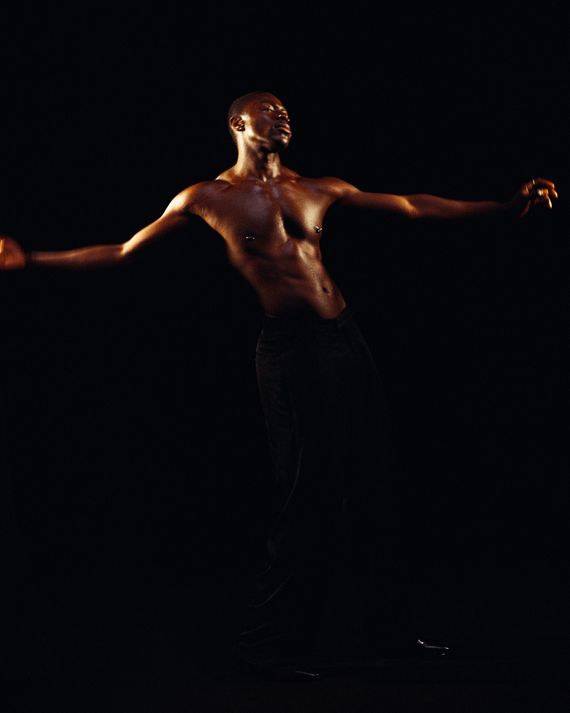
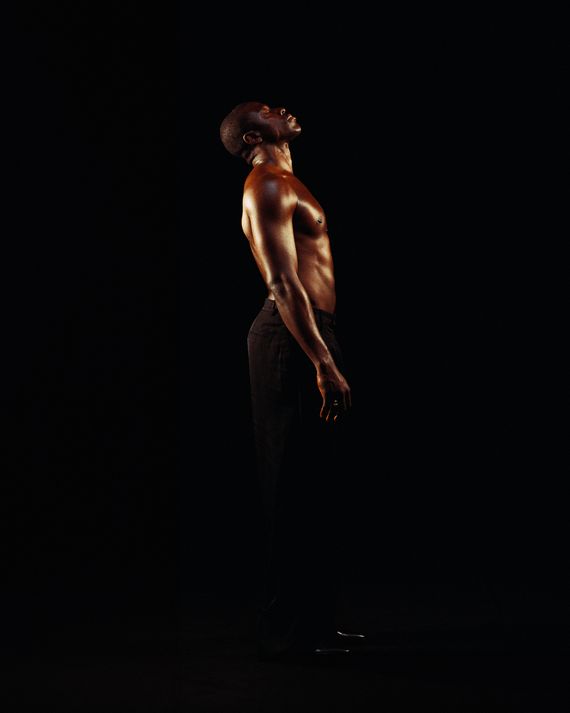
Sumney grew up with pastor parents in both SoCal’s Inland Empire and Accra. His family had some gospel and reggae CDs at home, but not until he was a teenager did he really find music on his own. “My dad wasn’t like, ‘Son, it’s time you learned about Aretha Franklin’ or ‘Y’all don’t know nothing about this James Brown.’ Or even African music. It was never like, ‘Oh, listen to King Sunny Adé or Miriam Makeba.’ There was actually just nothing.” By 7, he’d written his first song. And because he hadn’t been exposed to many musical influences in childhood, he was able to form his own taste when he started getting online. He was 16 when he discovered Ella Fitzgerald on YouTube. “It changed my life,” he says. “I don’t even know how I found her, but I was just like, Oh, there’s something deeper.”
“And then I moved to Stevie Wonder,” he remembers, “and then to Jeff Buckley and Radiohead.” Listening to voices like these, Sumney felt called to start making music himself. “These are my people. These are my cousins. We’re related in my weird brain,” he says he thought. Sumney’s musical influences became wide-ranging when he was studying poetry and creative writing at UCLA. The Cocteau Twins are one bedrock, as is Joni Mitchell. He is an ardent admirer of Björk. While preparing to write the new album, he listened to Jill Scott and Van Hunt. His current dream collaborators are Clairo, Alex G, and Victoria Monét — “another artist who’s been around for over ten years,” he adds. After his R&B album, he says the next one will be inspired by folk.
Following college, Sumney stayed in L.A. and continued writing and performing music. “On paper, I could have been a big pop star ten years ago, but I wasn’t ready to be one,” he says. “I had a lot of people who wanted to sign me to big record deals and for me to be in the major-label system and release pop-R&B music and be really sexy. And I was like, ‘Right. But I’m sad. So how am I going to do both?’ I wasn’t ready for that.”
Like most musicians in the streaming economy, Sumney has to do a lot of different things simultaneously to make a living as a working artist. The indie label Jagjaguwar released his first two albums, but since 2021, Sumney has put out music under his own label, Tuntum. He’s self-funding pop-up Sophcore performances, including ones where he sold some of his own clothes to his fans to promote “Vintage.” Since his second album, 2020’s Græ, Sumney’s attention has also turned to Hollywood. He made his acting debut last year in HBO’s dark take on the music business, The Idol. This summer, along with releasing Sophcore, he plays a pivotal role in his first feature film, MaXXXine, the third installment of A24’s hit horror trilogy from writer-director Ti West. Sumney had already found a niche licensing his songs for soundtracks and says people had long been telling him he should act. A few years ago, he started listening.
His friend Jeremy O. Harris had hipped him to HBO’s Euphoria before it came out, and Sumney connected with the high emotional stakes. After taking acting classes on Zoom in 2021, he auditioned for the role of a new student named Elliot on the show’s second season, but it ultimately went to fellow musician Dominic Fike. But Sumney got much further along in the audition process than he expected, and creator Sam Levinson took note of his talents; he used Sumney’s song “Me in 20 Years” for a crucial dramatic moment in a one-off episode. Not long after, Levinson told Sumney he had written a part for him in The Idol, and he quickly joined the cast as Izaak, a member of the cult run by Abel “the Weeknd” Tesfaye’s character, Tedros. On the show, Sumney got to sing and seduce Leia, played by Rachel Sennott. He was shooting The Idol when he got an audition for MaXXXine.
West and Sumney instantly hit it off. “I really liked talking to him,” says the director, who had seen Sumney perform once at the Hollywood Bowl, “and that’s usually how I cast people.” Sumney had a “unique energy” — captivating to watch but not showy — that made West think he could hold his own in scenes with star Mia Goth, who plays the titular Maxine Minx. “He’s a really ‘one of one’ kind of person,” he says. Sumney remembers thinking, “Huh, this is interesting … a scary movie.” Having grown up in a religious household, he wasn’t deeply acquainted with horror movies as a genre. To prepare, he watched a list of films that West sent, including Brian De Palma’s Body Double. Sumney transforms effortlessly into an ’80s video-store guy in MaXXXine. As Leon, an L.A. skater punk straight out of Vinyl Fetish or Vidiots who is Maxine’s closest thing to a friend, he brings a natural sweetness to his scenes that makes you pray Leon will make it out alive.
Moving into acting has opened up new possibilities for Sumney. He’d like to work with writer-director Cord Jefferson, who made American Fiction and is a fan of Sumney’s. He’d like to write and direct more, too; he directed the music video for “Vintage” off Sophcore, which includes a dramatic rain sequence in the tradition of ’90s R&B videos and a memorable dance break. He personally loves movies about regular people and the friction between emotions and circumstances. But he’s open to exploring just about anything. “I also would love to be an action figure who’s secretly just really sad and emotional,” he says. “A toy-soldier kind of person.” He’s being choosy about what acting projects he takes on, careful to strike a balance between film and music. “I am eager to act more but not so eager that I’ll do anything,” he says. “Luckily, I have a whole other career to tend to.”
At magic hour, the sky turns cornflower blue over Hollywood as Sumney closes out the showcase with a moving cover of “Who Knows Where the Time Goes?” He’s a fan of the Sandy Denny original with Fairport Convention and loves Nina Simone’s cover. The song is about the fleeting beauty of the natural world, yet it’s very hopeful. “So come the storms of winter,” he sings like a tear that is threatening to fall. “And then the birds in spring again, I have no fear of time.” He soars into his falsetto for the chorus. As the backyard string lights start to glow, Sumney’s voice glides further up into the darkening sky.


